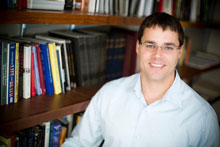
Cory Labrecque
Cory Andrew Labrecque, Raymond F. Schinazi Junior Scholar in Bioethics and Religious Thought, answered questions about the current fascination with zombies and what we can learn through discussion of "Zombethics." Labrecque is the co-chair of the second annual "Zombies and 'Zombethics'" symposium Friday, Nov. 1 at Emory's Center for Ethics.
How do you explain the current fascination with zombies?
Zombies – or, at least, the ones I have in mind – are animated beings that challenge our definitions of life and death, and our categories of living and dead. How can talking about a walking cadaver or the “living dead” – ostensibly oxymoronic images – not be fascinating? And since they do not seem to pose an immediate threat to us (as far as I can tell), entertaining thoughts about them doesn’t elicit too much fear or anxiety. It also helps that zombies are often depicted on television and in film as slow-moving, which gives me some hope – if all of this was real, of course – that I would be able to outrun them. Not the picture of bravery, I admit, but all of this is part of the fascination: trying to figure out how we would survive the zombie apocalypse.
What will your lecture at Emory be about?
I will be talking about this rather strange fascination that many of us have with the zombie genre. This should lead neatly into a discussion about the growing interest in this genre in the academy and the “pedagogical value” of zombies. In our first panel, a professor of history and a professor of biology will take up “Lessons Learned from the Zombie Apocalypse,” which is the subject of their forthcoming book. As an educator, I too am interested in pushing the boundaries of my own coursework. I expect my students to be able to take the content and skills they cultivate in my classes and apply them to contexts that are different than those I have exposed them to. Zombies are intriguing; they stir students to ask all kinds of questions. I will be talking about why the zombie genre is a helpful one for thinking through difficult ethical issues.
Why do we use zombies for these kinds of debates?
In addition to being innovative (I think), there is a certain appeal to the zombie genre because it can be constructively engaged by scholars in different academic disciplines here at Emory. Specialists in religion, neuroethics, medicine, disability studies, bioethics, film studies, and so on, can reframe familiar questions such as: when is a human being no longer a person? What is death? What is free will; do zombies have it? What is the ethics of quarantine and isolation? How do you allocate scarce resources when pandemics or disasters hit? Is there a time when you can throw up your hands and abandon ethics altogether? When the end is near, as they say, does this also mean the end of ethical conduct? We will get to many of these questions in the symposium.
What does the fascination with zombies have to do with religious thought?
I am interested in eschatology – the study of "last things" – in what and how the religions think about death and postmortem existence. So, zombies seem to be a natural (actually, I am not sure that zombies are “natural” at all!) fit for conversations about these concerns. Again, what is death? If, theologically, we might say that it is the separation of body and soul, for instance, then what is going on with the zombie? How might we talk about the sanctity and dignity of the human body in this context? How might we talk about the idea of a merciful, compassionate God in the midst of a zombie apocalypse? What happens to human relationships here? One of our panels takes up a question that is raised time and again in "The Walking Dead" series: what should we do when someone we love becomes a zombie and tries to eat us? Many of these are important and perennial questions outside of the zombie framework . . . well, maybe not the very last one.
What kind of ethical issues can we examine through portrayals of zombies and the undead?
My colleague, Karen Rommelfanger (who joins me in chairing Zombethics), and I are adamant about making plain to our audience members that although panelists might connect certain zombie characteristics to symptoms experienced by particular patient populations, this is to serve only as a starting point for difficult conversations – especially in bioethics – and should in no way trivialize what patients and their caregivers go through. Patient narratives are real and the way we think about them have serious implications. The zombie apocalypse is an imagined phenomenon through which we can ask pressing questions without being all that concerned for how the implications of our discussion might affect the zombie community. Here we might ask: Is the zombie a person? What do we owe the zombie? Is this still my relative or family member after he or she has been zombified?
What do you hope people will come away with in these discussions?
I hope that the audience will want to continue the conversation beyond the symposium, engaging the difficult questions we bring to the fore over the course of the day, both in the not-so-real context of zombies and in the real world we live in. I want my students to be able to identify – in the panelists’ presentations – a number of the ethical issues that we have seen in my "Catholic Bioethics" class, for instance, and be able to think about them in a constructive, integrative, and analytic way that draws out the importance of the moral imagination.
